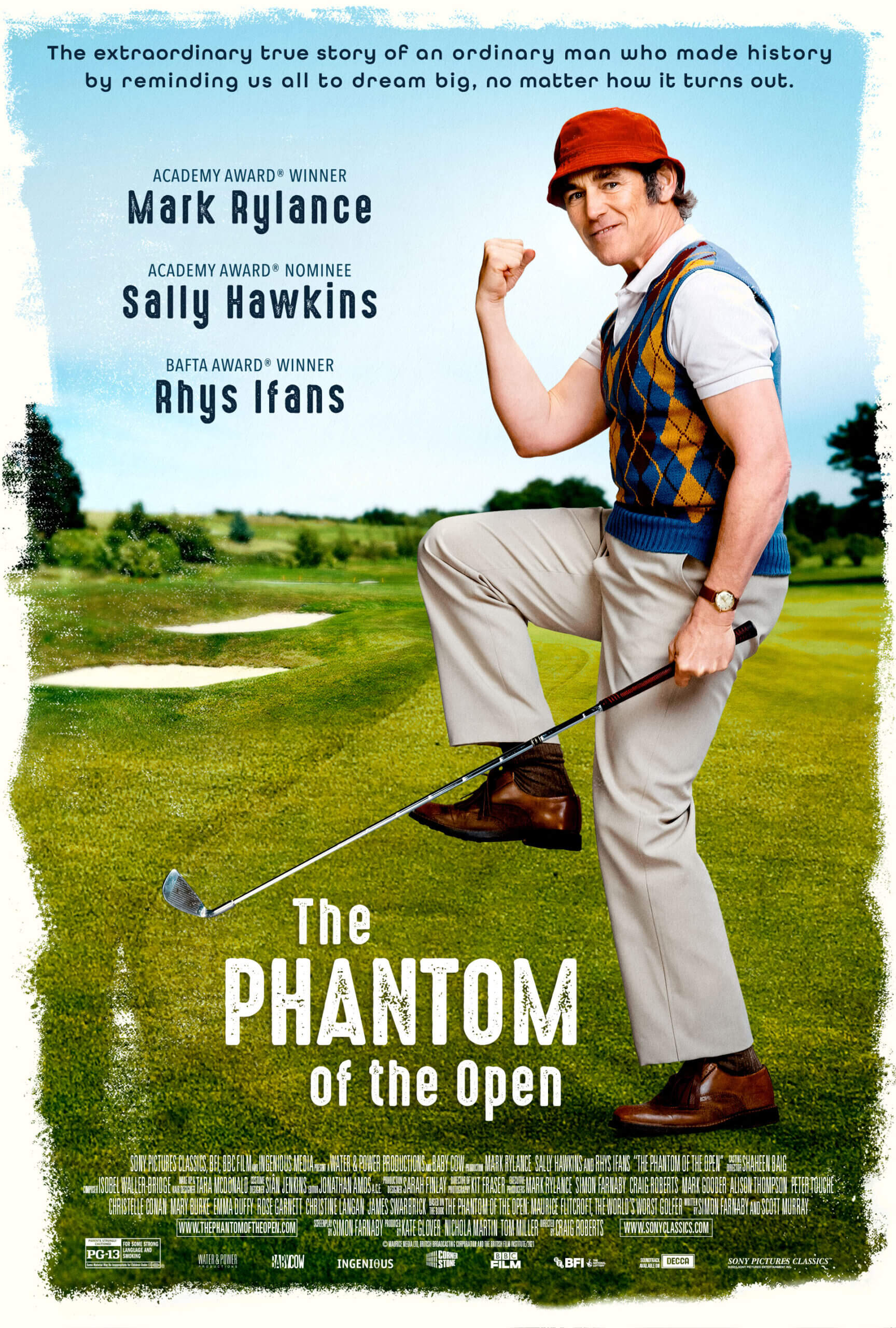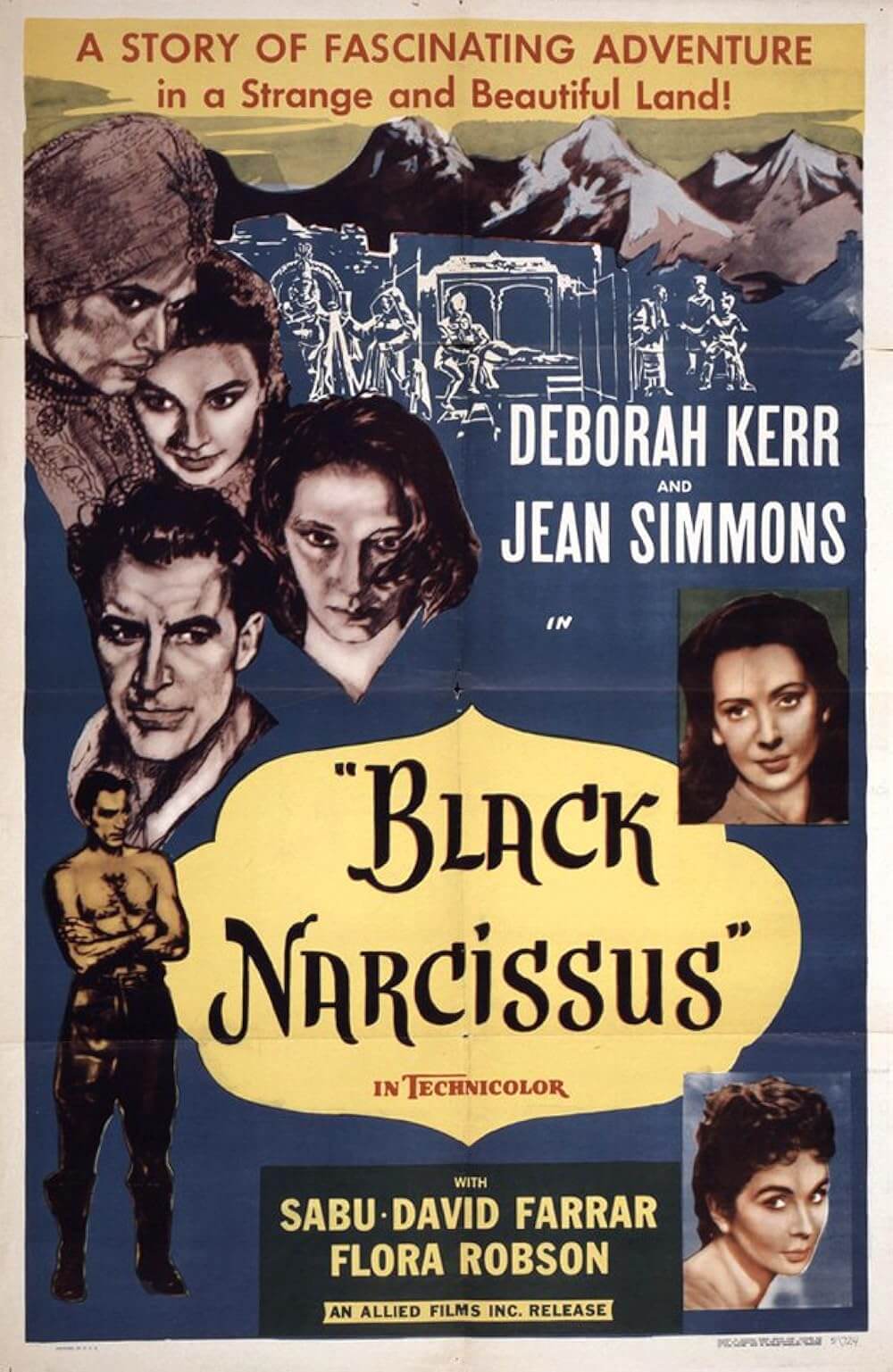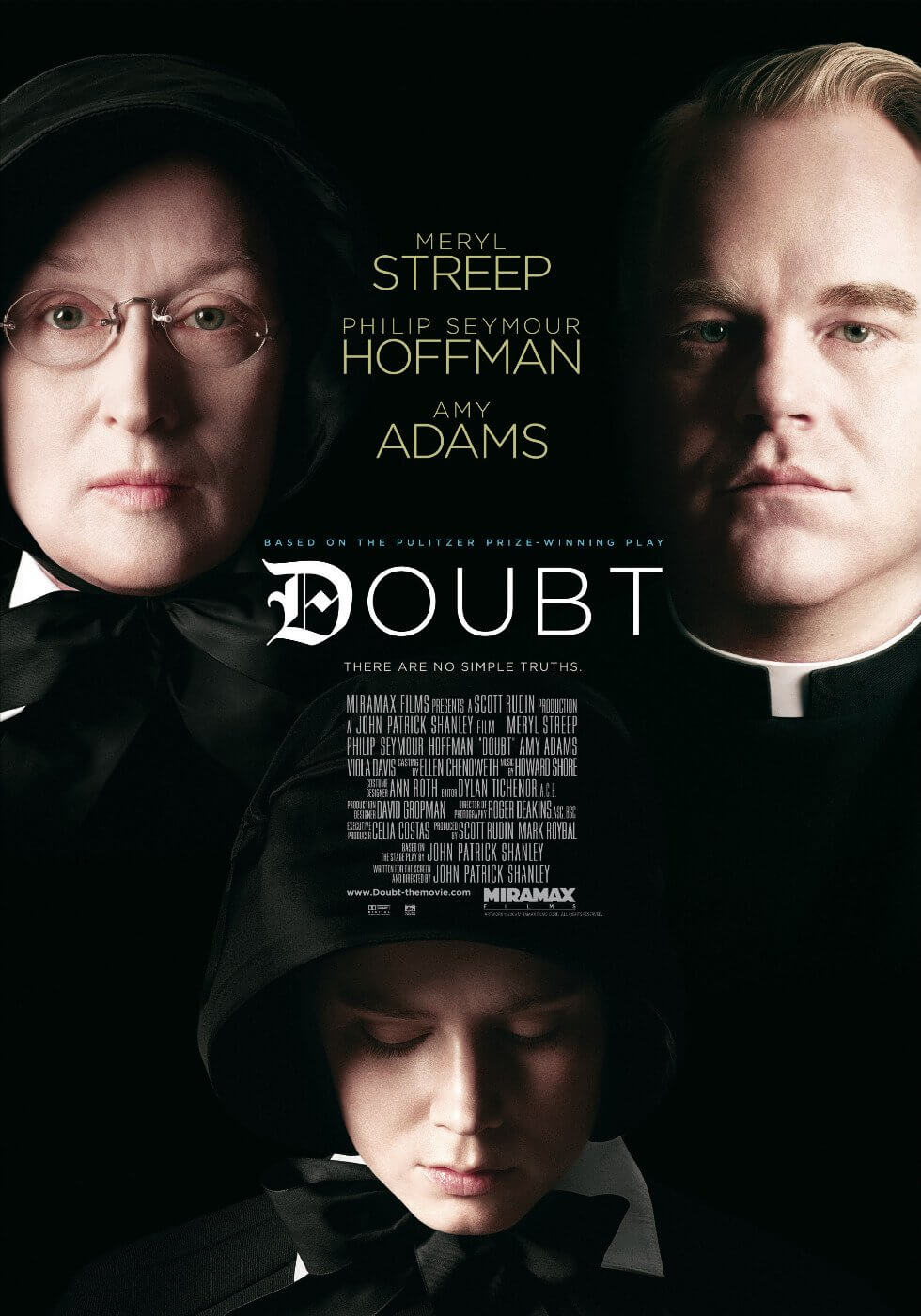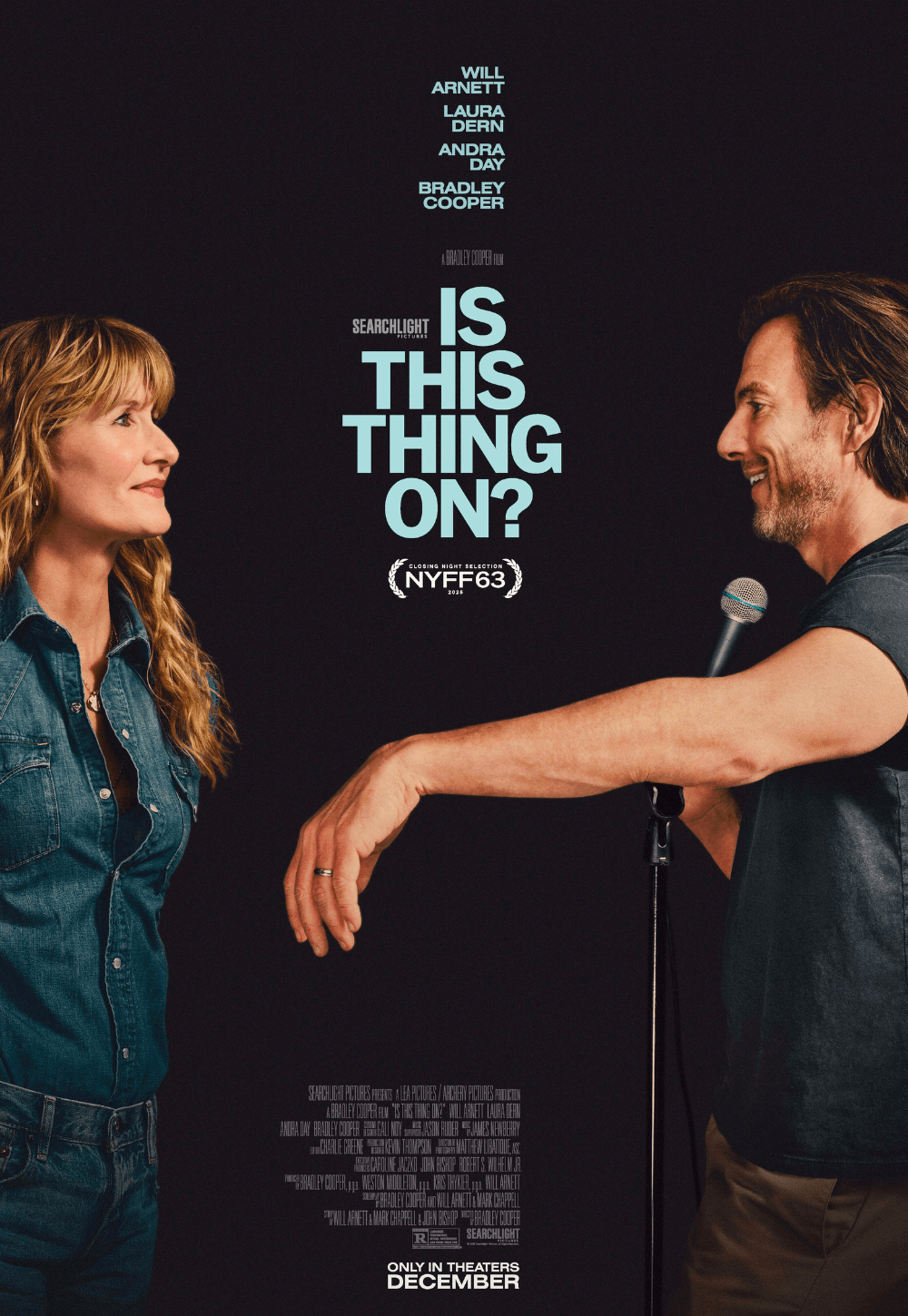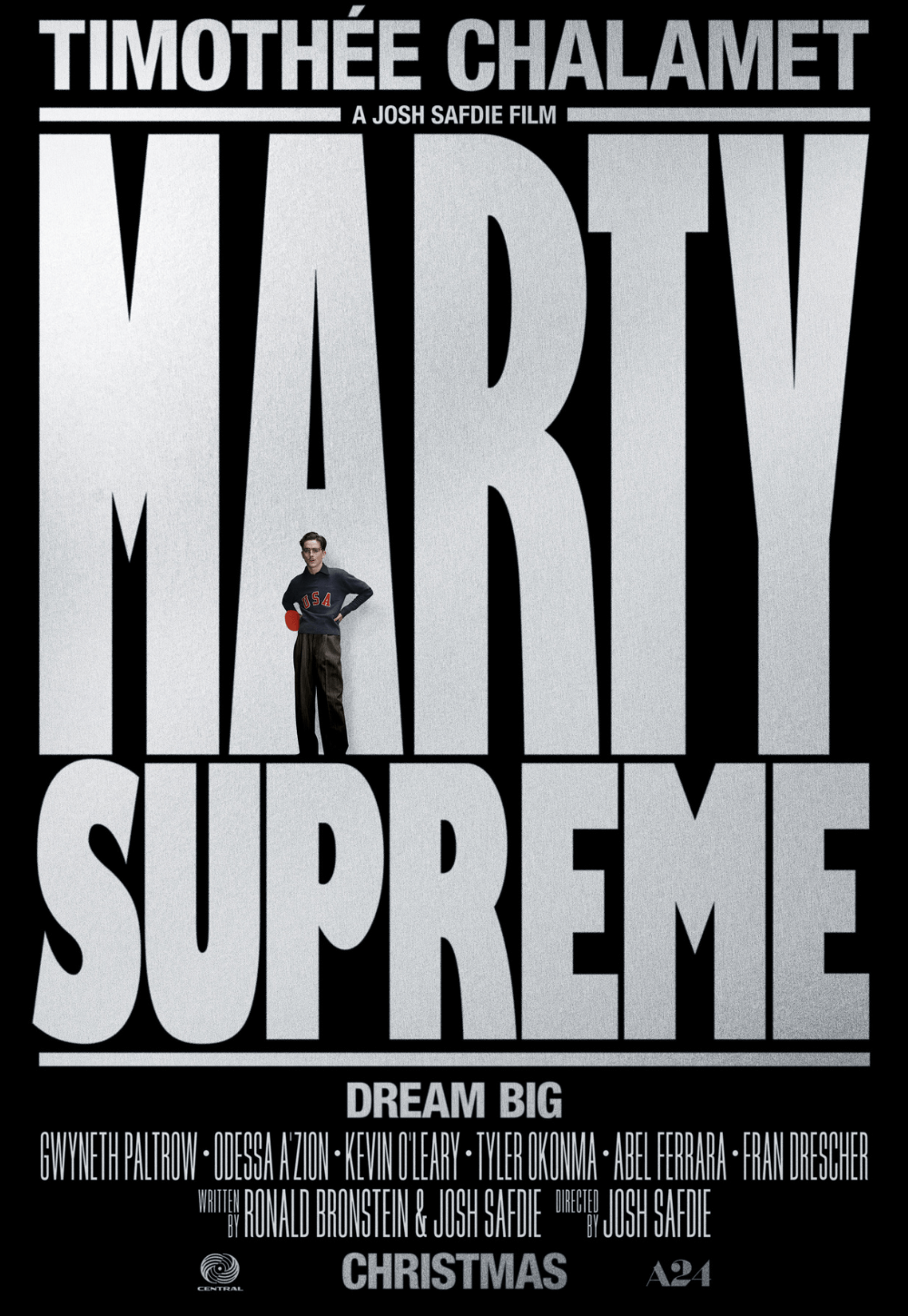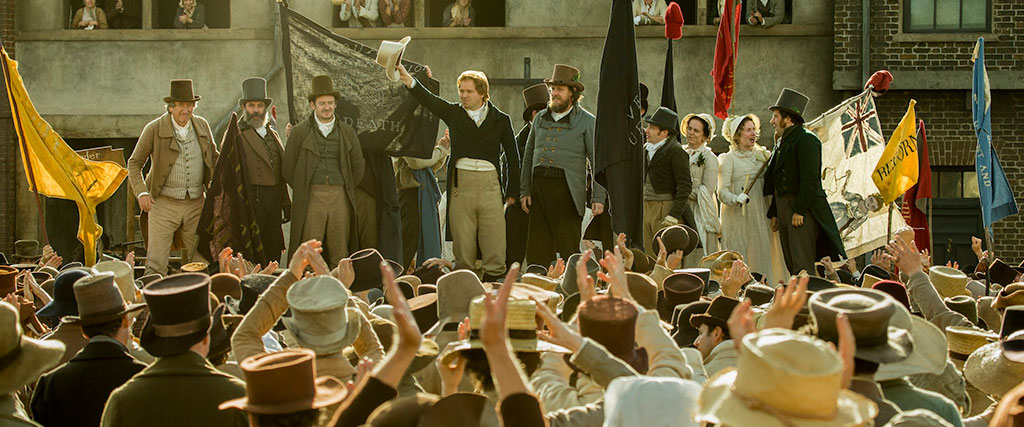
Peterloo
By Brian Eggert |
Peterloo opens on a battlefield, both literally and figuratively. Joseph, a lone bugler, appears lost in the pandemonium of war. He calls out for help but receives no reply. Allied forces, led by the British, have just won the Battle of Waterloo against Napoleon’s army. David Moorst, the unknown actor behind Joseph, winces and contorts his face, signaling the young soldier’s combat fatigue. With the trauma scarred onto his face, Joseph journeys home to Manchester by foot. His family, like most in the northern town, labor in the cotton textiles and endure a hard life. They struggle to survive under a debilitating bread tax and laws that restrict the importation of grain and corn from other countries. Many in Manchester believe their situation would change if only they could represent themselves with the vote. However, when their drive for political reform reaches its zenith in 1819, when some 60,000 British citizens without voting rights gather for a peaceful rally in St. Peter’s Field, the government responds with violence. Hundreds of cavalrymen ride into the crowd, unprovoked, slashing at random, killing 18 and injuring hundreds more. Although not commonly known in the United States, the Peterloo massacre remains a disgrace to the British, and writer-director Mike Leigh’s entrenched investigation of this moment in history resists allegorizing the event in contemporary terms, even if the parallels become achingly apparent.
Two centuries after the Peterloo massacre, Leigh brings his most expensive and lavishly realized production to life courtesy of Amazon Studios, who gave the director absolute control over the unlikely commercial prospect. After all, there’s no happy ending in this account of people who stood up to their government only to be publicly crushed. But the event is among the most important in the history of democracy in Britain, as it illustrates that suffrage is not given lightly but earned over time, sometimes painfully. The historical silver lining only becomes apparent years later, long after the government defended its actions and silenced other uprisings, when it conceded to an electoral system with the 1832 Reform Act. Even so, Leigh’s film contextualizes the massacre with a detailed study of the various parties involved, their sometimes opposing, and sometimes aligned but subtly different perspectives, with a rich sense of history. He applies the same level of intricacy to his treatment of this event as he does his involved, less scopic character studies, imbuing it with psychological veracity that proves both impressive and innovative.
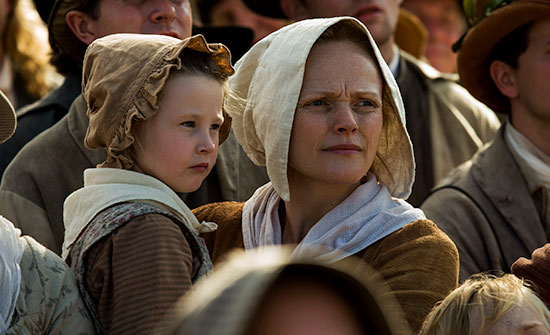 Peterloo bears a curious if singular structure. It unfolds with a series of political speeches, declarations, and maneuvers that build with a relentless momentum over the two-and-a-half-hour runtime. Watching speech after speech with a focus on the content of the material, as opposed to the inner life of the individual performing it, may not sound invigorating, except that Leigh alternates between the pro-democracy reformers and the governmental powers that oppose them. The antimony becomes more ingrained as the film carries on, creating a tension between the two sides, which culminates just 20 minutes before the end with the title’s massacre. From a certain point of view, the proceedings might be characterized as sluggish, which I point out only because about a third of the audience abandoned the film during my underattended screening. More than two hours of political speeches and relatively little by way of standard dramatic character work may seem difficult to endure, except that the speeches show democracy in action with a balance of intimacy and breadth. What’s so masterful about Peterloo is how Leigh frames an obscure historical conflict with such lucidity, leaving the viewer incensed over the 200-year-old event. This sort of approach is bound to have you either sitting upright and at attention, as I was, or struggling to digest the confrontation. More have had the latter reaction.
Peterloo bears a curious if singular structure. It unfolds with a series of political speeches, declarations, and maneuvers that build with a relentless momentum over the two-and-a-half-hour runtime. Watching speech after speech with a focus on the content of the material, as opposed to the inner life of the individual performing it, may not sound invigorating, except that Leigh alternates between the pro-democracy reformers and the governmental powers that oppose them. The antimony becomes more ingrained as the film carries on, creating a tension between the two sides, which culminates just 20 minutes before the end with the title’s massacre. From a certain point of view, the proceedings might be characterized as sluggish, which I point out only because about a third of the audience abandoned the film during my underattended screening. More than two hours of political speeches and relatively little by way of standard dramatic character work may seem difficult to endure, except that the speeches show democracy in action with a balance of intimacy and breadth. What’s so masterful about Peterloo is how Leigh frames an obscure historical conflict with such lucidity, leaving the viewer incensed over the 200-year-old event. This sort of approach is bound to have you either sitting upright and at attention, as I was, or struggling to digest the confrontation. More have had the latter reaction.
Key to appreciating Peterloo is watching the film as another of the 76-year-old director’s exhaustive studies in character, except the main character is a historical event. Leigh’s unorthodox work with actors is well-documented at this point—his performers develop their characters during the months of pre-production, so any ad-libbing or actorly impulse is ironically sketched out well in advance of the shoot—but his approach on Peterloo allows for fewer improvisations than his other films. Part of what makes the film so astonishing is Leigh’s devotion to historical accuracy, as he outlines the situation with economic clarity, spending equal time with the elitist officials and magistrates who represent the government, and the people who demand political reform. Lord Sidmouth (Karl Johnson), the Home Secretary, assigns the aquiline General Sir John Byng (Alastair Mackenzie) to head the military presence in Northern England and oversee the rumblings of insurrection. Meanwhile, in the north, several unaligned parties from journalists to community leaders seek reform of some sort. John Johnston (Johnny Byrom) and Samuel Drummond (Danny Kirrane) evoke an evangelical air of doom and implications of violence in their speeches. Their talk of taking their petition to the king and imprisoning him if they are ignored almost begs for a response from the government, and the very notion of their moniker “liberty or death” stands as a threat to those in charge. Other speakers want only fair living conditions for their families and townsfolk, while on the sidelines, Joseph’s family, his parents Nellie (Maxine Peake) and Joshua (Pearce Quigley), would become involved if not for their daily struggle to survive.
All the while, Leigh revives a forgotten discipline in Peterloo: the performative act of political speaking. He emphasizes several grandiose political speeches in the film and, through them, examines the physical and vocal differences in style between their performers. Most of his characters are based on actual people who made the recited arguments, though many of the speeches have been edited for length. What’s interesting about this approach is how Leigh also considers the spectators. At a meeting of women workers, one woman stands up to voice her protest, complaining about the hifalutin language used by the female speaker; she’s suspicious of anything she cannot understand. Only after several others paraphrase and simplify does she settle into the arguments, underscoring how complex political subjects often remain unaddressed due to the education gap between the speaker and their audience. Before long, the various parties of the north organize to commission Henry Hunt (Rory Kinnear), a famed orator, to represent their cause. Far removed from the poor folk he’s representing, Hunt appears in an outlandish white hat and long, extravagant coat. Given his abilities, he could have just as easily convinced crowds of an opposing view. His authority as a public speaker and ability to convince crowds of his stance is only matched by his smug superiority, a quality that brings to mind the power wielded by Andy Griffith’s “Lonesome” Rhodes in A Face in the Crowd (1957), who speaks of his audience as though they’re putty in his hands.
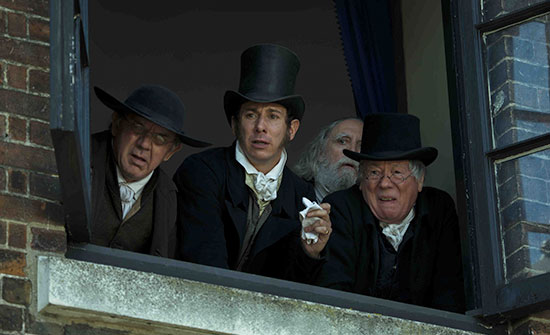 Some have critiqued the way Leigh treats the magistrates and royals as grotesque caricatures, except that the most absurd details he introduces are based on fact. One sequence shows a series of magistrates who try cases and issue excessive punishments, demonstrating their absolute power not only as judges but as “moral superiors” who also represent the church. All are based on actual cases: One woman who stole a bottle of spirits receives a lashing and 14 days in prison; a man who stole a pocket watch receives 14 years in an Australian penal settlement; another man is hanged for stealing a coat to stay warm. Leigh characterizes the magistrates, and indeed royalty, as “gilded reptiles” who demand obedience, especially after the events of Waterloo—they perceive the French Revolution and Napoleon’s bid for world domination as an uprising against authority, and thus an example of what might occur in the British Empire if public protest is allowed to continue. They believe it’s best to stomp out the flame of rebellion before it spreads. The organization in Manchester, then, is not viewed as people seeking human rights, but as the “greed of the laboring class” that must be answered with violence because “the rod is all they understand.” The hypocrisy of the ruling class knows no limits, and Leigh underlines this with the help of the production’s historical advisors, using accounts of the period.
Some have critiqued the way Leigh treats the magistrates and royals as grotesque caricatures, except that the most absurd details he introduces are based on fact. One sequence shows a series of magistrates who try cases and issue excessive punishments, demonstrating their absolute power not only as judges but as “moral superiors” who also represent the church. All are based on actual cases: One woman who stole a bottle of spirits receives a lashing and 14 days in prison; a man who stole a pocket watch receives 14 years in an Australian penal settlement; another man is hanged for stealing a coat to stay warm. Leigh characterizes the magistrates, and indeed royalty, as “gilded reptiles” who demand obedience, especially after the events of Waterloo—they perceive the French Revolution and Napoleon’s bid for world domination as an uprising against authority, and thus an example of what might occur in the British Empire if public protest is allowed to continue. They believe it’s best to stomp out the flame of rebellion before it spreads. The organization in Manchester, then, is not viewed as people seeking human rights, but as the “greed of the laboring class” that must be answered with violence because “the rod is all they understand.” The hypocrisy of the ruling class knows no limits, and Leigh underlines this with the help of the production’s historical advisors, using accounts of the period.
Elsewhere, the few scenes between Lady Conyngham (Marion Bailey) and the Prince Regent (Tim McInnerny), the despised future King, George IV, may seem almost parodic, but then portrait paintings and political cartoons from the era demonstrate they are just as ridiculous and downright monstrous as Leigh depicts them. They appear in caked-on makeup and powdered wigs because that’s how they dressed; they stuff their faces because commentators from the period frequently remarked about their overindulgences and increasing girth. George IV, in the end, died of gastrointestinal maladies resulting from his laziness and rich diet.If their characters seem comically over-the-top, especially compared to the harsh realism of the plebeians in Manchester, it’s because Leigh recognizes the veracity of such class disparities in their historical context. Rarely do members of royalty or other grand rulers bear any resemblance to the people they lead. Is their preposterous behavior in the film any less plausible than the existence of the current U.S. president, with his gold-obsessed décor, orange-tanned face, and inarticulate public speeches?
When the massacre finally unravels onscreen, Leigh moves with gradual steps toward the chaos, bringing a palpability to the dynamics of the situation. Knowing that the military might show, Hunt has told the community’s leaders to spread the message that no weapons should be carried by the attendees. Men with carts gather and take away any stones in St. Peter’s Field, removing the temptation to launch a projectile at the authorities in attendance. As thousands gather, their sound roars over the magistrate who attempts to read the riot act to an oblivious throng. The people’s flags read “peace and goodwill,” and the so-called dignitaries toast to “king and country” as their plan for a violent response ensues. The cavalry attacks as the magistrates watch from the safety of a drawing room that overlooks the square. People scatter every which way as men on horses swing their swords indiscriminately into the crowd, slashing and stabbing men, women, and children. It’s a sequence of such size and atrocity that the viewer can find no appropriate reaction, except sitting, hand over mouth, is awe and disgust.
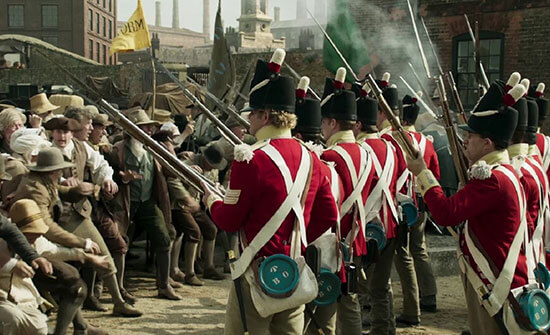 Although the majority of Leigh’s work belongs to a category of contemporary human dramas about the everyday lives of average people, a subset of historical dramas has also emerged in his work in the twenty-first century, beginning with the Gilbert and Sullivan showpiece Topsy-Turvy (1999). Vera Drake came in 2004, featuring Imelda Staunton as a working-class woman who performs illegal abortions in the 1950s. Most recently, his biopic Mr. Turner (2014) revitalized interest in J. M. W. Turner, whose nautical scenes prefigured the impressionist movement’s use of light. In Peterloo, his production retains a jealous devotion to historical realism, evidenced in the work of production designer Suzy Davies, costume designer Jacqueline Durran, and Christine Blundell’s hair and makeup. Spare interiors, wooden spoons and bowls, rags for clothes, and bad teeth occupy the Manchester scenes, giving the film a transportive quality. Leigh’s longtime cinematographer Dick Pope uses natural light to give everything onscreen an authentic, never over-produced look, while the massacre sequence is inspired by the period’s engravings and political cartoons of the eponymous event. Besides a shot or two supported by CGI to render a cityscape, no aspect of Peteroo rings false—and this is especially true of its themes.
Although the majority of Leigh’s work belongs to a category of contemporary human dramas about the everyday lives of average people, a subset of historical dramas has also emerged in his work in the twenty-first century, beginning with the Gilbert and Sullivan showpiece Topsy-Turvy (1999). Vera Drake came in 2004, featuring Imelda Staunton as a working-class woman who performs illegal abortions in the 1950s. Most recently, his biopic Mr. Turner (2014) revitalized interest in J. M. W. Turner, whose nautical scenes prefigured the impressionist movement’s use of light. In Peterloo, his production retains a jealous devotion to historical realism, evidenced in the work of production designer Suzy Davies, costume designer Jacqueline Durran, and Christine Blundell’s hair and makeup. Spare interiors, wooden spoons and bowls, rags for clothes, and bad teeth occupy the Manchester scenes, giving the film a transportive quality. Leigh’s longtime cinematographer Dick Pope uses natural light to give everything onscreen an authentic, never over-produced look, while the massacre sequence is inspired by the period’s engravings and political cartoons of the eponymous event. Besides a shot or two supported by CGI to render a cityscape, no aspect of Peteroo rings false—and this is especially true of its themes.
“Some things get better. Some things never change,” remarks one character. It’s a statement that emphasizes the continued need to fight for democracy, despite incidents like the one depicted in Peterloo. The Kent State shootings, for instance, call attention to a historical pattern that links protest, violence, and equality in traumatic ways. Yet, the film is no mere political statement or parable. Contained within its challenging narrative structure are a hundred small, human moments that ring of beauty and desperation, and a hundred more that demonstrate the director’s skilled ability to disentangle a complicated situation and present it clearly. As ever, Leigh puts forth scenes of despair on Peake’s weathered face, comical observations about Hunt’s ego, and profound truth in the cruelty of the magistrates. Still, as with any moment in history, Peterloo contains lessons that can be extracted, remembered, and processed in new or alternative contexts. Leigh reminds us that democracy requires the communication of ideas to compel people to action; however, even then, a corrupt government may ignore or decide to stomp out the voice of the majority. It’s a masterfully made film, and a passionate statement from a humanist filmmaker that never resorts to drawing modern-day parallels; he does not need to, as the implications remain intractable.
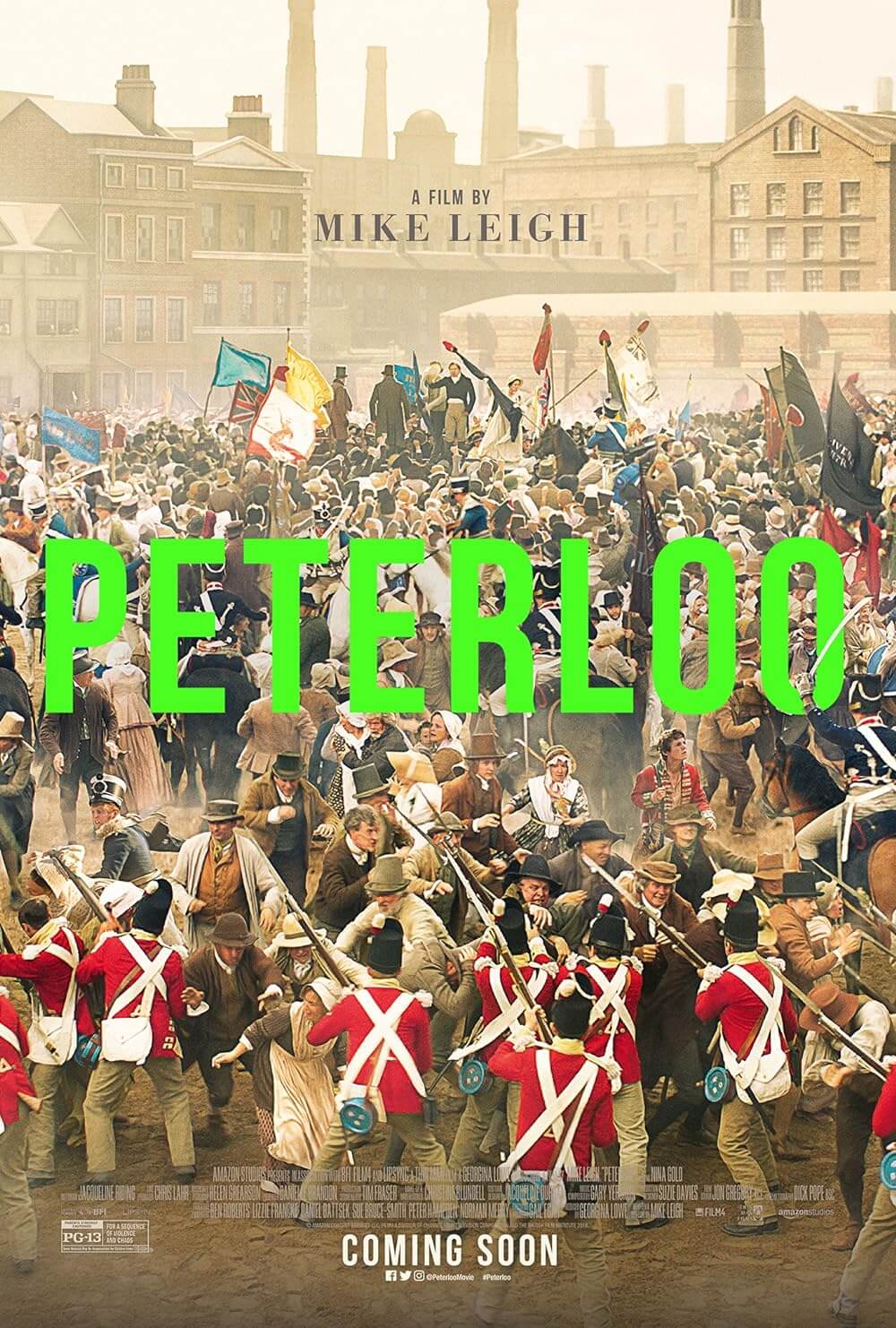
Thank You for Supporting Independent Film Criticism
If the work on DFR has added something meaningful to your love of movies, please consider supporting it.
Here are a few ways to show your support: make a one-time donation, join DFR’s Patreon for access to exclusive writing, or show your support in other ways.
Your contribution helps keep this site running independently. However you choose to support the site, please know that it’s appreciated.
Thank you for reading, and for making this work possible.
Brian Eggert | Critic, Founder
Deep Focus Review


